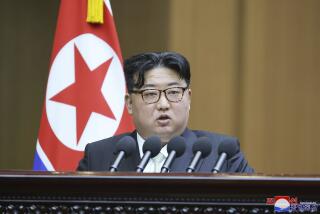S. Korea, China Denounce Japan’s Version of History
- Share via
SEOUL — The presidents of South Korea and China on Tuesday jointly lambasted Japan for whitewashing its wartime past, in the strongest expression of common political ground during their historic summit here.
Skirting the delicate issue of North Korea, the two leaders devoted the bulk of a news conference and much of a summit meeting to denouncing Japan.
The joint condemnation came one day after a Japanese Cabinet minister was forced to resign for controversial remarks on his nation’s imperialist past and as Japan prepared to assume center stage as host of the Asia-Pacific Economic Cooperation forum gathering this week in Osaka.
South Korean President Kim Young Sam, noting that Japanese leaders have made at least 30 remarks distorting their nation’s past aggression in the five decades since the end of World War II, vowed to put an end to the practice.
In decidedly undiplomatic language, Kim declared, “They must be cured of their bad habit.”
Kim’s unyielding stance on the issue forced the resignation of Takami Eto, head of the Management and Coordination Agency, on Monday for saying that Japan’s colonization of Korea from 1910 to 1945 produced such benefits as roads, bridges and a public education system.
In a display of political hardball, Kim had threatened to cancel his summit meeting with Japanese Prime Minister Tomiichi Murayama this week and recall his ambassador to Japan unless Eto was fired.
Jiang Zemin, on the first state visit to South Korea by a Chinese president, warned against an emerging militaristic movement in Japan and said leaders there must face their past and atone for it.
“No part of history can be undone,” Jiang said. “Japan should view history from the right perspective and try to take a path toward peace.”
In an attempt to calm the furor, Murayama sent Kim a personal letter Tuesday acknowledging that the 1910 annexation of Korea was the result of an “unequal treaty” in an era of imperialism. Earlier this year, Murayama had set off a storm by saying the annexation was legally valid; Koreans assert it was foisted on a resistant King Kojong and affixed with a phony royal seal.
Murayama’s letter did not touch on legality--just as Eto did not apologize for his remarks--leaving the core issues unresolved. But he wrote Kim that “it was undoubtedly a treaty in the era of imperialism that did not allow national self-determination and dignity.”
Jiang, in a speech to the South Korean National Assembly, said that China holds no designs to dominate Asia and that its military buildup is purely defensive.
“To allege that a stronger China will pose a threat to other countries is totally groundless,” he said.
More to Read
Sign up for Essential California
The most important California stories and recommendations in your inbox every morning.
You may occasionally receive promotional content from the Los Angeles Times.














